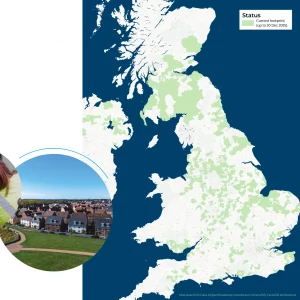Sponsored Links
UK ISPs and Internet Firms Slate Government Plans to Block Piracy Sites
Posted: 10th Mar, 2010 By: MarkJ
 The bosses of several major broadband ISPs and Internet firms, such as BT , Virgin Media and Google, have issued an open letter to the FT criticising the governments last-minute addition of Amendment 120A to the Digital Economy Bill (DEB). 120A would force ISPs into blocking websites deemed to contain "a substantial proportion" of content that infringes copyright, which could just as easily apply to YouTube as it would a dodgy P2P links site (original news).
The bosses of several major broadband ISPs and Internet firms, such as BT , Virgin Media and Google, have issued an open letter to the FT criticising the governments last-minute addition of Amendment 120A to the Digital Economy Bill (DEB). 120A would force ISPs into blocking websites deemed to contain "a substantial proportion" of content that infringes copyright, which could just as easily apply to YouTube as it would a dodgy P2P links site (original news).The letter itself warns that such blocking could damage business in the country, would widely disrupt the internet and could even threaten Freedom of Speech. It also attacks the serious lack of consultation and rushed nature of the approach, calling it "very poor lawmaking".
Quote from the FT Letter
Sir, We regret that the House of Lords adopted amendment 120A to the digital economy bill (“Bill will censor internet, providers claim”, March 6). This amendment not only significantly changes the injunctions procedure in the UK but will lead to an increase in internet service providers blocking websites accused of illegally hosting copyrighted material without cases even reaching a judge. The amendment seeks to address the legitimate concerns of rights-holders but would have unintended consequences that far outweigh any benefits it could bring.
Endorsing a policy that would encourage the blocking of websites by UK broadband providers or other internet companies is a very serious step for the UK to take. There are myriad legal, technical and practical issues to reconcile before this can be considered a proportionate and necessary public policy option. In some cases, these may never be reconciled. These issues have not even been considered in this case.
...
Tom Alexander,
Chief Executive, Orange
Richard Allan,
Director of Policy EU, Facebook
Neil Berkett,
Chief Executive, Virgin Media
Matt Brittin,
Managing Director, Google UK and Ireland
Charles Dunstone,
Chairman, Talk Talk Group
Stephen Fry
Jessica Hendrie-Liaño,
Chair, Internet Services Providers Association
Jill Johnstone,
International Director, Consumer Focus
Jim Killock,
Executive Director, Open Rights Group
Mark Lewis,
Managing Director, eBay UK
Ian Livingston,
Chief Executive, BT Group
Sarah Oates,
University of Glasgow
Jenny Pickerill,
University of Leicester
Mark Rabe,
Managing Director, Yahoo! UK and Ireland
Paul Reilly,
University of Leicester
Jess Search,
Founder, Shooting People independent film makers
Ian Walden,
Queen Mary, University of London
Tom Watson MP
Sir, We regret that the House of Lords adopted amendment 120A to the digital economy bill (“Bill will censor internet, providers claim”, March 6). This amendment not only significantly changes the injunctions procedure in the UK but will lead to an increase in internet service providers blocking websites accused of illegally hosting copyrighted material without cases even reaching a judge. The amendment seeks to address the legitimate concerns of rights-holders but would have unintended consequences that far outweigh any benefits it could bring.
Endorsing a policy that would encourage the blocking of websites by UK broadband providers or other internet companies is a very serious step for the UK to take. There are myriad legal, technical and practical issues to reconcile before this can be considered a proportionate and necessary public policy option. In some cases, these may never be reconciled. These issues have not even been considered in this case.
...
Tom Alexander,
Chief Executive, Orange
Richard Allan,
Director of Policy EU, Facebook
Neil Berkett,
Chief Executive, Virgin Media
Matt Brittin,
Managing Director, Google UK and Ireland
Charles Dunstone,
Chairman, Talk Talk Group
Stephen Fry
Jessica Hendrie-Liaño,
Chair, Internet Services Providers Association
Jill Johnstone,
International Director, Consumer Focus
Jim Killock,
Executive Director, Open Rights Group
Mark Lewis,
Managing Director, eBay UK
Ian Livingston,
Chief Executive, BT Group
Sarah Oates,
University of Glasgow
Jenny Pickerill,
University of Leicester
Mark Rabe,
Managing Director, Yahoo! UK and Ireland
Paul Reilly,
University of Leicester
Jess Search,
Founder, Shooting People independent film makers
Ian Walden,
Queen Mary, University of London
Tom Watson MP
The concerns are certainly understandable and appear to give Rights Holders cart blanch to have any website they please blocked from view without prior fair and impartial legal oversight. Internet access providers who fail to comply could find themselves hauled up before the courts, an expensive and risky process for all concerned.
However ISPs are unlikely to defend websites that they have nothing to do with in the courts. Most would simply, albeit begrudgingly, roll over and do as asked by what is starting to look like a new commercial copyright police force of Rights Holders. That's an awful lot of power to give the creative industry.
The BPI has obviously dismissed such claims as "pure scaremongering," though a group of 25 Liberal Democrat parliamentary candidates have already called for the bill to be debated at their party conference this weekend. Somewhat ironic considering two Lib Dem peers helped put 120A forward in the first place.
Elsewhere BT Retail has proposed an equally questionable alternative of fining those accused of copyright infringement. People who refuse to pay would instead be dragged before the courts. Of course several controversial solicitors, such as ACS:Law, have already tried that one with mixed degrees of success and huge unpopularity.
Search ISP News
Search ISP Listings
Search ISP Reviews
Latest UK ISP News








Cheap BIG ISPs for 100Mbps+
150,000+ Customers | View More ISPs
Cheapest ISPs for 100Mbps+
Modest Availability | View More ISPs
Latest UK ISP News
Helpful ISP Guides and Tips
Sponsored Links
The Top 15 Category Tags
- FTTP (6920)
- BT (3919)
- Politics (3122)
- Business (2822)
- Openreach (2703)
- Building Digital UK (2538)
- Mobile Broadband (2529)
- Statistics (2164)
- FTTC (2153)
- 4G (2134)
- Virgin Media (2071)
- Ofcom Regulation (1803)
- 5G (1786)
- Fibre Optic (1617)
- Wireless Internet (1615)
Sponsored
Copyright © 1999 to Present - ISPreview.co.uk - All Rights Reserved - Terms , Privacy and Cookie Policy , Links , Website Rules






























